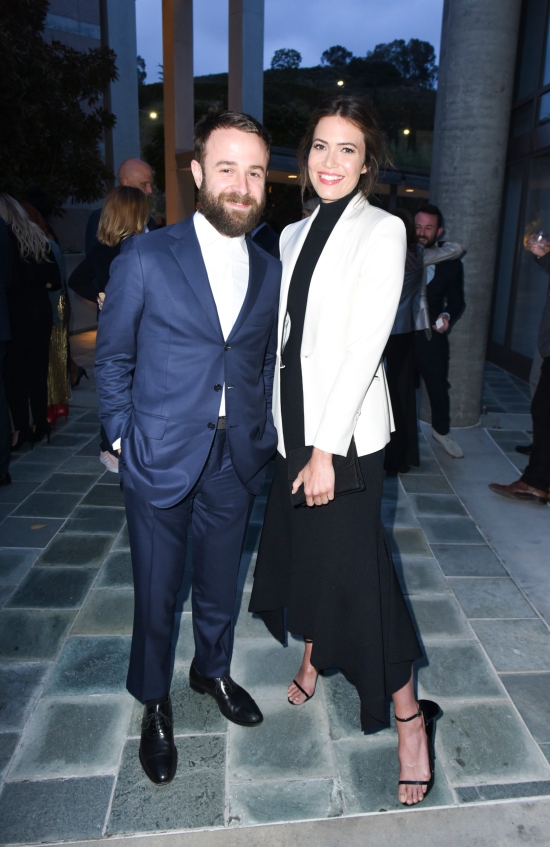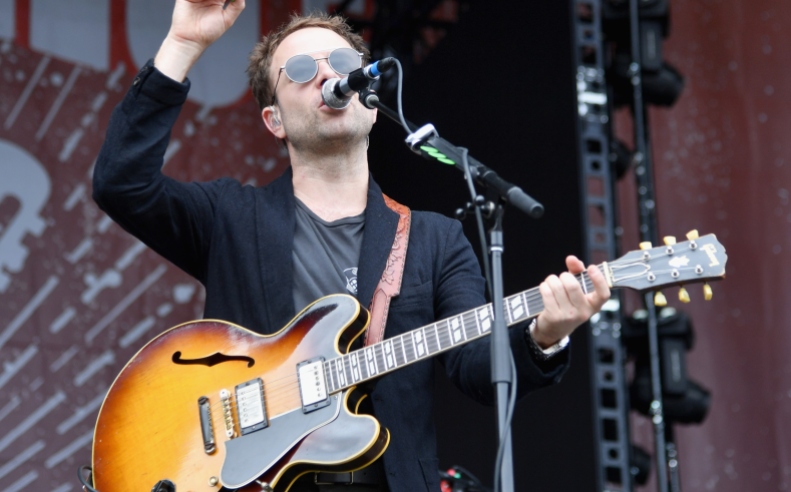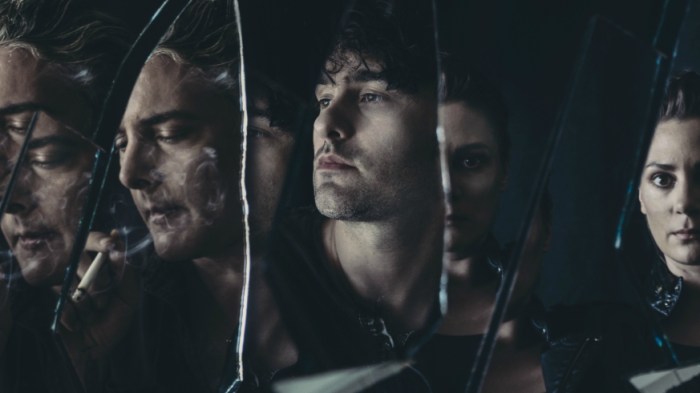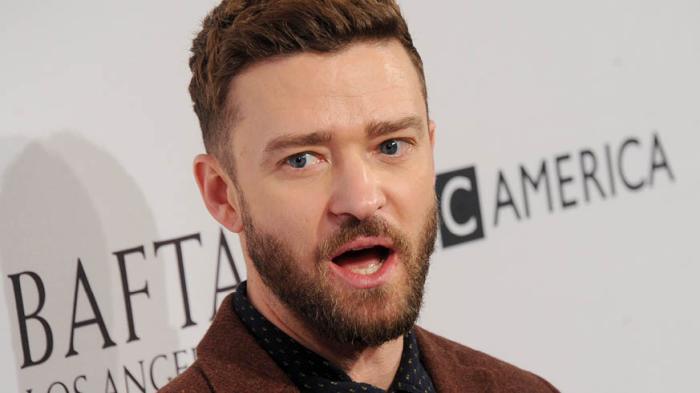Staying put doesn’t come easy to Taylor Goldsmith. Over the past 10 years, his band Dawes have worked tirelessly to carve a unique space for themselves, mixing a unique blend of classic Laurel Canyon ’70s-style Americana with Goldsmith’s keen and insightful wordplay. In the past year, Dawes had released a brand new album, Passwords, that found them expanding their sound with elements of futuristic funk and R&B. At the start of 2019, the band will be hitting the road for a few special dates billed as “An Evening with Dawes,” where the band will run through highlights from throughout the last decade of being a band. We sat down with Goldsmith to talk about Passwords and evolving as a songwriter.
Taylor Goldsmith on the ever-evolving sound of Dawes
Dawes: Taylor Goldsmith (front), Griffin Goldsmith, Lee Pardini, and Wylie Gelber. Photo: Matt Jacoby
What was the writing and recording process for your record Passwords?
Taylor Goldsmith: It was great because we’re the kind of band, you know, we’re Dawes, and we don’t have gigantic budgets or are able to live in the studio for six months. We always go in really prepared. We do pre-production in a rehearsal space so all four of us really know the material. So, by the time that we do get in the studio, we can make the most of our time.
This is the first time that we didn’t have that because our producer, Jonathan Wilson, was about to leave for the road with Roger Waters and we were getting home. At that point, we were opening for John Mayer, and after that, we loaded into his studio that day and we started the next day. Because of that, we had no time to really learn the material. Obviously, we probably played around with the music, during sound checks, and had some general ideas of certain things. But songs like “Time Flies Either Way” or “Feed the Fire”, we were learning them and coming up with parts like on the floor, right in front of the mics.
In some cases, what ended up being the take were [takes where] we weren’t even sure if we knew the song yet like in the song like “Stay Down”. So, that was the first time that it actually felt like a session in that sense, where we really had to maintain eye contact, and cue sections, because the material was so fresh to us. Looking back, I’m very grateful for that because I think it really added dimension to the record that we don’t always have because we always make sure to know it already. I like when there are hints that the band is thinking on their feet, or reacting to each other especially in like “Time Flies Either Way” or “Crack the Case”, where you can hear certain decisions one guy is making… you know things like that.
The band has been associated with that Laurel Canyon Americana sound since the beginning. But, the last two albums both had a lot of interesting funk and soul elements to them. Are you finding a lot of inspiration from current R&B and pop?
Taylor Goldsmith: It’s funny. Our band is a band. It’s not Taylor Goldsmith. It’s not like a singer-songwriter, so because of that, I try to keep it as open to their interpretation as much as I can. I would not know how to guide Griffin [Goldsmith], my brother who plays drums. I would not know how to guide him through playing what he played on a song like “Time Flies Either Way” like that’s something that’s completely from him. With his inspirations from jazz music, and whatever else.
You know, I feel like I should probably listen to more contemporary music because it would probably do our careers some favors if I did (laughs). I mean there are some contemporary songwriters that I love, I love Father John Misty. I love Jason Isbell. I love Brandi Carlile. There are certainly folks that are doing it that I, you know Bill Callahan, but it’s not like I’m aware of anything on the top 40 charts. I don’t have this dialogue with our sound, [saying] “Okay, what are we going to do to make it different? What are we going to do to make it not be like last time?” like we don’t really think about that conscious thing we really just try the follow our inspiration, and sometimes it’s funny because sometimes I feel like my concern is always going to be that it’s too much like it always was. When I finish a song like “Crack the Case”, “Never Gonna Say Goodbye”, “Greatest Invention”, or whatever, I think to myself “Aw man, are people going to hear this and think ‘oh, that’s just Taylor doing the thing that he does every time’”? So to me, if anything, I get nervous that I think is going to be too much like it used to be.
But, I also recognize that I have no control over that nor do I want any. I feel like if I started trying to shape how and why it’s different or something you’d be able to tell. I think you would be able to kind of sniff the bullsh-t, and you would be able to say this isn’t coming naturally to anybody. This is just so that they can tell themselves that they are growing even though that’s kind of not true. The same goes for the opposite. if we were like “No, guys. We are Dawes. We have to play an acoustic guitar. We have to have two part harmonies. We have to play the song really slow.” I think people would also sniff the bullsh-t with that, too. I feel like there’s a lot of songs [on Passwords] that obviously could exist on any Dawes record. But, I also think there are songs on every Dawes record that could exist on any Dawes record. Maybe that’s not true. I’m kind of the last guy who has any kind of objectivity, but that’s always how it felt to me. People will talk about how we change, and I appreciate that because we have to and I’m glad that people are picking up on that… I’m really proud of the fact that at least as far as I can tell, it’s always felt like the same DNA of a band.
You also got married in 2018 to Mandy Moore. While it seems like it must have been a happy year, you lyrical content on Passwords takes on some of the more challenging topics in our society today. Do you find more inspiration writing songs that take on these larger issues than writing about the things that make you happy?
Taylor Goldsmith: I mean, there is a lot of things going on there (laughs). On one hand, I feel a responsibility as an aging songwriter, not that I’m old, but the fact that I’m not in my twenties anymore. I feel a bit of a responsibility not to drag you through that proverbial mind of “she left me and now I’m sad” and “I want her but she doesn’t want me”. I feel like when you find these songwriters who are in their 40’s or 50’s, or whatever, and they’re still kind of exploring that emotion it feels a little bit uncomfortable for me as a listener. Sometimes, I feel like that seems very appropriate when you’re 23. This assumption that everyone wants to talk about you is very real when you’re 23.
For me, when I think back on songs that were written for North Hills and Nothing is Wrong, sometimes I kind of want to wince at how much I just assumed that people would want to give a sh-t about my own personal dirty laundry. While it makes me wince, I feel like it’s totally appropriate and I’m very proud of it for that being what I wrote about at that time. As I’ve gotten older, when I look at the artists that not only have been able to stick around forever but also live adjusted lives… Guys like Elvis Costello. I think [he] is a great example. They’re able to inhabit other people’s lives or situations or attitudes in a way that is really not easy to do as a writer. It’s really impressive when it’s done well, and it’s a big part of why a writer can stay good, and so that’s something I wanted to be mindful of. I don’t want to just write about, “here’s me and here’s my adventures in romance”. I’m pretty sure that’s part of my songwriting and it is in Passwords to a certain degree, but I don’t want itself to be the only thing because I think that that would get tired. For you and for me. So, I want to make sure it’s going beyond that. Because I care about a lot more than that in a way that maybe I didn’t in my twenties.
About the other thing… I feel like in order to sing them every night, I need for there to be some kind of catharsis or else I’m just not going to want to sing it. If my song says “she doesn’t like you anymore she doesn’t love me anymore she doesn’t want to be with me and I don’t know why the end”, like that’s just not nice to myself. I don’t want to feel that emotion and I don’t want to be left with that emotion as a listener. There are certain songs that I actually think are great, but they leave me with this emotion where I don’t like the way I’m feeling. Maybe that’s important. Maybe that’s an edifying relationship with a song that’s going to make me better as a person. But, that also might not keep me coming back. I might not listen to that song a hundred times the way that I might listen to a song that’s a little bit more powering or hopeful… Even “Living in the Future” might seem like it has a bleak attitude. It has a kind of scary keyboard sounds on it. But, the first two lines of the chorus are still “We’re livin’ in the future, so shine a little light”. It’s almost cheesy how positive it’s trying to be.
Unfortunately, that’s just who I am, so I have to try to lean into it. Same with “Crack the Case”. “I wanna sit with my enemies and say we should have done this sooner”. These are songs where It’s not just a mere announcement of a problem, it’s also a coupled with some sort of suggestion as to how to treat it. Whether that goes beyond just a personal relationship for one brief moment, I don’t know. But that’s something that’s important to me as a writer. I don’t want to drag you through the mud and leave you there, is what I’m trying to say.

Taylor Goldsmith with his new wife, Mandy Moore. Photo: Getty Images.
Dawes has now been a band for 10 years. In that time, the band has been able to cover a lot of ground. Are you at a point where you are able to enjoy your successes as they happened in the band?
Taylor Goldsmith: Absolutely. The answer is yes. It’s definitely two things at once. the first time we got to play the Ryman a couple years ago, there’s this feeling of “oh my God. We’re going to sell out the Ryman tonight and it’s going to be incredible. It’s going to be one of the best nights of our lives.” Coupled with this feeling of how do we come back and do two nights or how do we come back and do three nights or how do we sell more records. I think spiritually, whatever that word means, I feel like I used to resent that second attitude. Like, OK , let’s just be grateful and present and just shut your ambition off for a second. But, I realized I wouldn’t be getting to appreciate those moments at all if it weren’t for that ambition. So I tried to allow for both.
When we’re getting to play these rooms and we’re beginning to get recognized and we’ve been a band for 10 years I can feel it right now and I try to really stop and say myself, “this is what you want, you’re living that dream, you’re as lucky as you wanted to be” and really living in that experience and feeling. But, at the same time, that other voice is saying “what’s next? What do you do from here? How do you take it to the next level?” And now, I allow for both voices to coexist.
Head here to grab tickets to see Dawes on their upcoming tour.




















